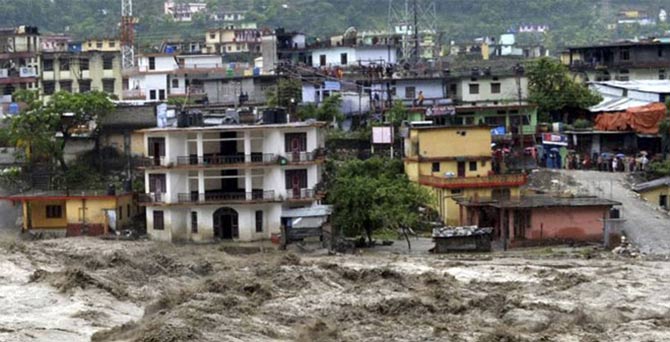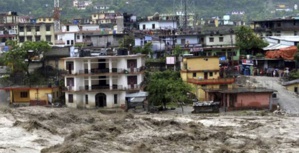As per a new report released by the U.S. National Oceanic and Atmospheric Administration (NOAA) 2014 has been the warmest year ever recorded since man started keeping statistical records of the climate. Eastern-North America has been the only region in the world to have experienced a below average annual tempartures.
“The variety of indicators shows us how our climate is changing, not just in temperature but from the depths of the oceans to the outer atmosphere. It’s been a pretty persistent and continuous message over the past 10 years at least that we are seeing a planet that is warming,” said Thomas R. Karl, NOAA’s Director for National Centers for Environmental Information.
The report is based on inputs received by 413 scientists located at 58 different countries around the world. The report shows change in climatic patterns and trends in the global climate system, resulting from various kinds of greenhouse gases, effecting temperatures throughout the atmospheric levels, cloud covers, land, ocean, snow cover, sea ice extent and ocean salinity.
The greenhouse gases which are causing this record increase in the rise of global temperatures have increased atmospheric carbon dioxide (CO2) concentrations by 1.9 ppm (parts per million) in 2014. This has also significantly boosted the global average to 397.2 ppm for 2014. Comparatively, when a similar exercise was done in 1990, 25 years ago, the global average was 354.00 ppm.
The Earth’s surface temperature too has increased. Every region in the planet has been affected by it.
For Europe it has been its warmest year on record. As for Africa, its temperatures have been above average throughout 2014. For Australia it has been its third warmest year ever. Mexico has always been blistering hot, the temperatures have gone up a notch higher, as for Uruguay and Argentina it has been its second warmest year on record.
Surface temperature in the seas have gone up resulting in higher sea levels and destruction of maritime eco systems. The global upper ocean heat content also hit record highs. As a result 2014 has witnessed 91 tropical storms, which is well above the 1981-2010 average of 82 storms a year.
Greg Johnson, an oceanographer working at the NOAA’s Pacific Marine Environmental Laboratory, was of the opinion that climate change is now irreversible.
“I think of it more like a fly wheel or a freight train. It takes a big push to get it going but it is moving now and will continue to move long after we continue to pushing it. Even if we were to freeze greenhouse gases at current levels, the sea would actually continue to warm for centuries and millennia, and as they continue to warm and expand the sea levels will continue to rise,” he said.
This report adds to the mountain of data which is pointing a clear fingers to the catastrophic dangers of climate change.
This December will bear witness to an ensemble of civil society members with governments coming together to hammer out a legally binding agreement that will curtail the release of greenhouse gases to the atmosphere. This will be the first time in 20 years, that an universal legally binding treaty is being put in place aimed at checking the rise of global temperatures below two degrees Centigrade.
References:
http://www.ipsnews.net/2015/07/2014-another-record-shattering-year-for-climate/
“The variety of indicators shows us how our climate is changing, not just in temperature but from the depths of the oceans to the outer atmosphere. It’s been a pretty persistent and continuous message over the past 10 years at least that we are seeing a planet that is warming,” said Thomas R. Karl, NOAA’s Director for National Centers for Environmental Information.
The report is based on inputs received by 413 scientists located at 58 different countries around the world. The report shows change in climatic patterns and trends in the global climate system, resulting from various kinds of greenhouse gases, effecting temperatures throughout the atmospheric levels, cloud covers, land, ocean, snow cover, sea ice extent and ocean salinity.
The greenhouse gases which are causing this record increase in the rise of global temperatures have increased atmospheric carbon dioxide (CO2) concentrations by 1.9 ppm (parts per million) in 2014. This has also significantly boosted the global average to 397.2 ppm for 2014. Comparatively, when a similar exercise was done in 1990, 25 years ago, the global average was 354.00 ppm.
The Earth’s surface temperature too has increased. Every region in the planet has been affected by it.
For Europe it has been its warmest year on record. As for Africa, its temperatures have been above average throughout 2014. For Australia it has been its third warmest year ever. Mexico has always been blistering hot, the temperatures have gone up a notch higher, as for Uruguay and Argentina it has been its second warmest year on record.
Surface temperature in the seas have gone up resulting in higher sea levels and destruction of maritime eco systems. The global upper ocean heat content also hit record highs. As a result 2014 has witnessed 91 tropical storms, which is well above the 1981-2010 average of 82 storms a year.
Greg Johnson, an oceanographer working at the NOAA’s Pacific Marine Environmental Laboratory, was of the opinion that climate change is now irreversible.
“I think of it more like a fly wheel or a freight train. It takes a big push to get it going but it is moving now and will continue to move long after we continue to pushing it. Even if we were to freeze greenhouse gases at current levels, the sea would actually continue to warm for centuries and millennia, and as they continue to warm and expand the sea levels will continue to rise,” he said.
This report adds to the mountain of data which is pointing a clear fingers to the catastrophic dangers of climate change.
This December will bear witness to an ensemble of civil society members with governments coming together to hammer out a legally binding agreement that will curtail the release of greenhouse gases to the atmosphere. This will be the first time in 20 years, that an universal legally binding treaty is being put in place aimed at checking the rise of global temperatures below two degrees Centigrade.
References:
http://www.ipsnews.net/2015/07/2014-another-record-shattering-year-for-climate/


 2014 has been the hottest year ever on record.
2014 has been the hottest year ever on record.





 Companies
Companies